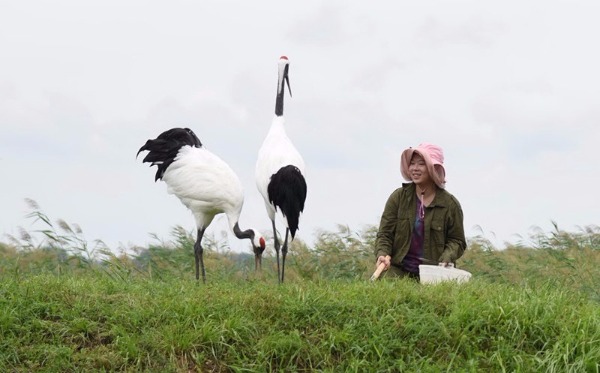Walking her family's path, she nurtures cranes


Every day, Xu Zhuo opens her diary and writes down the details of the daily work feeding, breeding, inoculating and curing red-crowned cranes - the same work her father and aunt did decades ago.
Xu, 25, turned down a postgraduate recommendation from Northeast Forestry University to become a researcher in breeding and protecting red-crowned cranes in Zhalong Nature Reserve, Heilongjiang province, after her university graduation in 2016.
The reserve, covering an area of 210,000 hectares, hosts Asia's biggest reed swamp - an ideal crane habitat.
Home to 15 varieties of the birds, and with about 300 wild red-crowned cranes, it was listed as an International Important Wetland Protectorate in 1992.
In April 2014, Xu's father Xu Jianfeng died in a motorcycle crash. He had been working in the wetland for two days to protect a baby crane and was exhausted as he made the trip back home. The motorcycle ran off the road and into a ditch.
At the time, Xu Zhuo was a sophomore studying horticulture at Northeast Agricultural University.
The unexpected death of her father changed her original idea of being a horticulturist in a southern city.
"When I read my father's diary, I was touched by his detailed record of raising red-crowned cranes since 1997," Xu said. "After finishing reading all the diaries, I decided to continue the record."
Without hesitation, she transferred to Northeast Forestry University to study wildlife conservation.
"The university is also my aunt's alma mater," she said. "I think it is the best way to cherish her memory."
Her aunt, Xu Xiujuan, also devoted her life to the protection of red-crowned cranes at the age of 23.
A popular Chinese song in 1990s tells the story of Xu Xiujuan falling into the marsh and dying while trying to save a crane in Yancheng, Jiangsu province, in September 1987.
"Although I have never seen my aunt, I grew up with the song and her story, which guided my life," said Xu Zhuo. "As the third generation of my family to protect the red-crowned cranes, I will continue walking that road."
Yang Wenbo, director of the Zhalong Nature Reserve administration, said: "With the efforts of Xu's family, as well as many protectors like them, we have got effective methods to artificially propagate the species.
"We have a population of 430 red-crowned cranes and more than 260 other varieties of rare birds inhabiting the wetland."
- Cross-Strait art festival opens in Taiwan highlighting Chinese characters
- China's Greater Bay Area marks one-year countdown to National Games
- Xi signs order to promulgate regulations on supporting military equipment
- Chinese, Indonesian presidents pledge joint efforts to build community with shared future
- Binjiang substation to address increasing power demand in Anhui
- China's J-15D, J-15T fighter jets to debut at air show




































